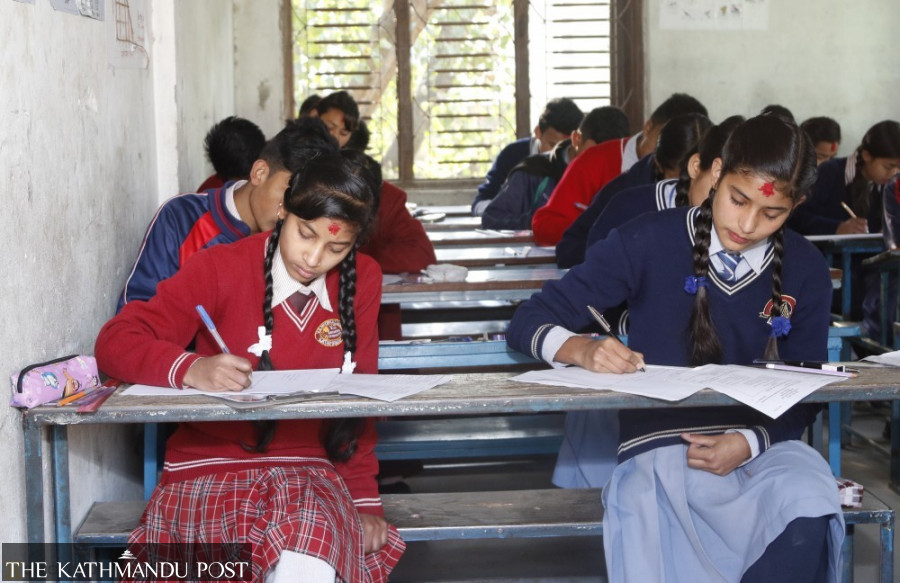National
Decentralise SEE and honour statute, experts advise government
Education experts say the government with a centralised mindset doesn’t want to lose any of its authority.
Binod Ghimire
The government in February decided to continue conducting the Secondary Education Examinations (SEE) centrally against the suggestions from various quarters and the directive of the Parliamentary Committee on Education to decentralise the exams.
The exams, originally slated to commence on May 27, were postponed following a spike in coronavirus cases. With no possibility of conducting the exams, the government on June 1 decided that the National Examinations Board would issue certificates based on internal evaluation of the students.
It was decided that students would be graded based on their performance in the terminal examinations, assessment of the subject teachers and practical tests.
A similar grading approach was adopted last year after the Covid-19 pandemic led to the shutting down of schools for most of the year.
Although the board had tried to systematise the evaluation process, it remains more or less the same as it was last year.
The board will be issuing certificates to some 517,000 students this year based on internal evaluation.
Call for decentralising the SEE has been raised ever since the three tiers of government came into existence through the 2017 elections. However, the federal government has been reluctant the idea.
This year, even after the recommendation by the social committee of the Cabinet to decentralise the test, the government decided to conduct it centrally.
The committee, based on the directive issued by the Parliamentary Committee on Education and the suggestions from stakeholders, had recommended that the authority of conducting the Grade 10 final exams should be delegated to local governments.
“The government didn’t heed our suggestion,” Jayapuri Gharti, chair of the committee of the now dissolved House, told the Post. “Though the conventional SEE wouldn’t be held even this year due to the pandemic, the government should still decentralise the authority to conduct the exams, as per the spirit of the constitution.”
Schedule 8 of the Constitution gives local governments authority to manage school education and take necessary measures to manage the school-level education within their jurisdictions. They are free to hire teachers, conduct tests and even develop curricula based on the national framework prepared by the Curriculum Development Centre.
The federal government, however, has been saying the Education Act 1971 only allows regional authorities to hold the exams and not the local governments.
The eighth amendment to the Act in 2016 says the School Leaving Certificate Examinations (later renamed as SEE) would be held at the regional level. The provinces have replaced the regions after the promulgation of the new constitution.
“But the constitution prevails over the Act,” said Gharti. “There shouldn’t be a problem in delegating the authority as per the constitution.”
The federal education Act would have given a solution to this problem, she said.
The constitution prescribes a federal education law to delegate the educational authority among the three tiers of the government. However, six years have passed since the constitution was issued, and the government is yet to formulate the Act.
Some education experts say the SEE has already been decentralised twice due to the pandemic and that the government should continue it permanently.
“The pandemic has given an opportunity to hold the test as envisioned by the constitution,” Binaya Kusiyait, a professor at Tribhuvan University, told the Post.
He said as the SEE’s evaluation is done based on the grading system, the continuous assessment rather than the three-hour memory tests fits to it.
The schools have the role for the continuous assessment while the local governments can oversee the evaluation process. The continuous assessment approach and test the practical knowledge of students, rather than using the traditional examination format. Under continuous assessment, teachers will evaluate the day-to-day performance of students and rate them based on their overall performance in the entire academic year.
The education experts say the government with a centralised mindset doesn’t want to lose any of its authority. Dhananjaya Sharma, former principal at Gyanodaya School, Bafal, says as the grade 12 is the final year for the school education, the central examination should be concentrated to grade 12.
“The government wasn’t willing to localise the tests but the pandemic compelled it to do so,” Sharma told the Post. “I believe after allowing the schools to conduct the tests twice the government has understood there is nothing wrong in decentralising it.”




 8.79°C Kathmandu
8.79°C Kathmandu















